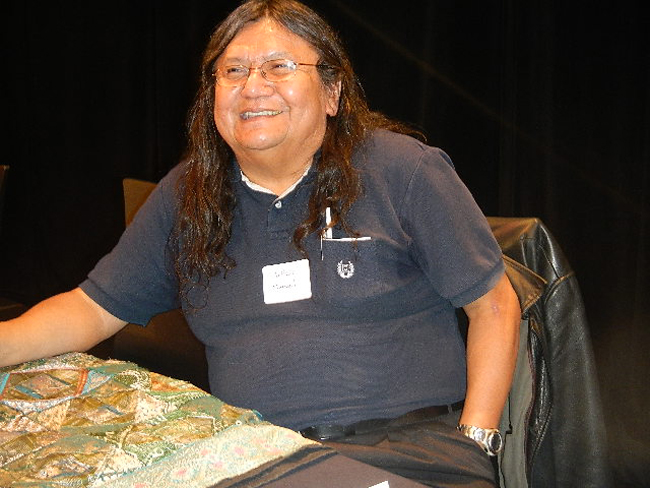Harper’s last stand to be fought over First Nation land

By Laura Robinson
TORONTO – In Toronto’s beautiful new Daniel Spectrum Arts and Culture Hall, and across the street from a sparkling new “swimming hole”, Grand Chief Gordon Peters of the Association of Iroquois and Allied Indians, oversaw an evening committed to change, and dedicated to ending Prime Minister Harper’s reign. If the new facilities, part of a multi-year commitment to changing Regent Park from a ghetto to a healthy thriving neighbourhood, are a predictor of what is to come, indeed, these will be Harper’s last years in power.
The April 2nd event: “Harper’s Last Stand: Truth or Reconciliation” – was sponsored by Toronto Council Fire and the United Church of Canada, and began with Chief Gordon Peters engaging audience discussion along with keynote speaker Arthur Manuel from Secwepemc Nation. They mapped out a strategy of Constitutional and activist challenges, noting that the 250th anniversary of the Royal Proclamation of 1763 – perhaps the first of many double-edged swords offered by colonists – may be celebrated by some, but “it’s not really a positive thing for First Nations.”
The “elephant in the room” at every government meeting since the Proclamation, said Peters, has always been “First Nation people – our treaties and our rights. The government hides them. They have switched the focus to ‘accountability’”– just the latest of many “huge deceptions established by the federal government.” Instead, Peters urged change, such as an educational curriculum that would have a mandatory inclusion of the history of colonialism, particularly the role of residential schools played in the destruction of people, communities and cultures.
Manuel echoed these sentiments and added that today’s “struggle is based on land. You can’t talk about ‘Indian governments’ without talking about land rights.” The immediate goal now must be to stop “the unlimited growth the Harper government is engaged in” ensuring resources in First Nations land are extracted, despite Supreme Court decisions making it clear First Nations people must be consulted and be at the table in a decision-making capacity. There must be a strategy and balance, says Manuel, that brings together traditional relationships with land, water and all life sustained by such gifts, and the modern technology that can provide jobs to First Nation populations who desperately need them.
Next up were panelists Darlene Ritchie (Oneida), Sylvia Maracle (Tyendinaga) and J’net Cavanagh (Nuu-chah-nulth) whose knowledge and compassion was all-encompassing and inspiring. Maracle – executive director of the Ontario Federation of Indian Friendship Centres – returned to the underlying theme of poverty, saying as long as government ensures First Nations people live in poverty, the army of service agencies that are usually nearly totally staffed by non-Natives will be supplied with jobs. “We have become an industry and fodder for the services. We should charge them a fee every time a new job is created through the perpetual enforced poverty of First Nations people,” she said.
Cavanagh, who is a social worker, also dwelled on issues of poverty, but noted “all are entitled to the good life” and that life does not have to be measured by wealth. Do not ignore, “the good company around you” because those people will help you live very well indeed. She told the “concrete Indians” in attendance they are still the descendents of those who knew the traditions of the land and water — a connection that cannot be severed, even if they operate in a modern urban environment.
All three panelists addressed the “epidemic of violence against women today” which is particularly horrendous against First Nation women. “I truly believe Stephen Harper hates women; maybe he hates Indigenous people a little more” commented Ritchie. The combination of that hatred is clear in the cutting of essential services for women, and the way in which Harper does not acknowledge the country’s murdered and missing women.
A follow-up regional Truth and Reconcilation Commission gathering will occur in Toronto in June 2013. Watch Toronto Council Fire and United Church of Canada sites for further information.


